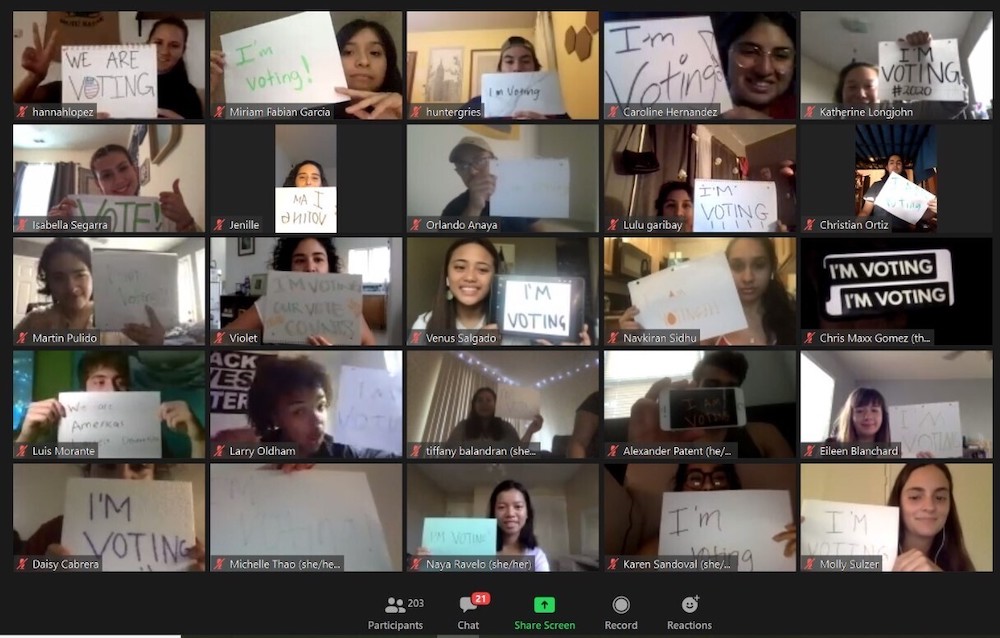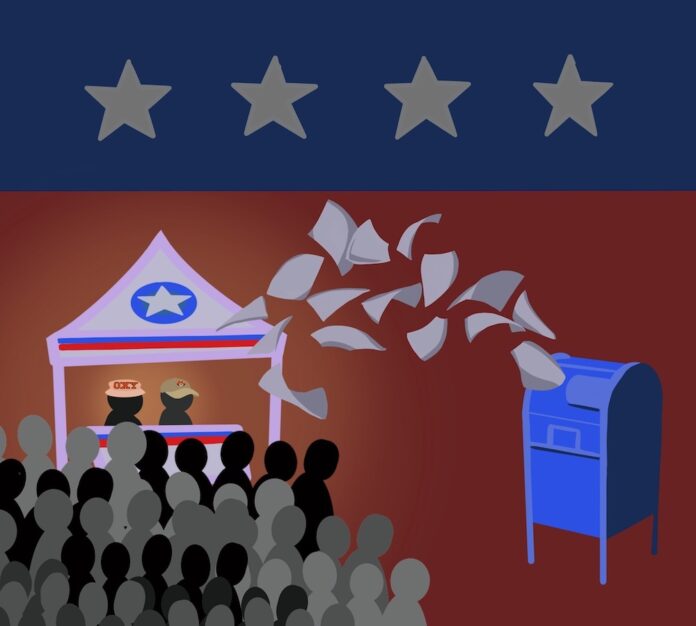Instead of writing cover letters and scouring internship websites for campaign opportunities, Kyler Parris (junior) took advantage of Twitter. While the social networking site is primarily known for its short and entertaining tweets, Parris saw the site as a way to connect with Washington D.C.-based political consultants. His employment tactic paid off after a tweet about a job opening for a campaign caught his eye. After messaging a campaign consultant multiple times, Parris got a job offer. Currently 20 years old, Parris now holds the position of campaign manager for Angie Homola, who is running to represent Washington state’s 10th district in the state House of Representatives. Parris’ modern-day recruiting story highlights the importance of virtual tactics in today’s political sphere.
“I’ve always been involved in politics but mainly through unpaid experiences,” Parris said. “I wasn’t expecting to be able to get the opportunity to manage a campaign. It shows how campaigns want to bring in young people and be innovative.”
The pandemic shifted much of the political groundwork for this election online, making virtual interactions increasingly common, Parris said. Typical campaign activities like door-knocking, house parties, town halls and debates that Parris and other volunteers are accustomed to are now out of the question due to local and statewide social distancing restrictions.
“It’s weird to be running a campaign right now,” Parris said. “Even I work from home which is about an hour away from my candidate. It’s definitely interesting running a campaign but most of the time being out of office.”
While not ideal, this shift away from in-person interaction provides a more accessible environment for students who are at home with virtual classes this fall but are looking for ways to get involved, Parris said.
There are many ways for students to be active participants in politics this fall, even if it is not at the highest levels, according to Carissa Torres (sophomore).
Torres is part of California Public Interest Research Group (CALPIRG) Students, a sub-organization of the CALPIRG. CALPIRG is non-partisan and committed to empowering students politically, according to Torres.
“Students have been at the forefront of social change throughout history, from civil rights to voting rights, to protecting the environment,” Torres said. “CALPIRG has connected passionate students with professional staff across college and university campuses to help students get organized, mobilized and energized so they can shape the future they will inherit.”
According to Torres, one of the first and most basic things students working from home can do is register to vote, or if already registered, check their registration status.
“Registration is quick and easy — it takes about 2 minutes — and can be completed at castudentvote.org,” Torres said. “If you’re already registered you can check your registration status to make sure it’s active and updated at the National Association of Secretaries of State website.”
Through her work with this organization, Torres said she has been able to make an impact on national, statewide and local politics. She has also had the opportunity to work closely with college students across California, which she believes has been equally rewarding. All of this has provided Torres with what she sees as essential work skills.
“This is my first experience with election volunteering, but through my work with the organization, I have learned activism, outreach, and relational organizing skills that are applicable not only to our New Voters project but to other activism efforts as well,” Torres said.
Veronika Michels, a full-time CALPIRG staff organizer and Occidental’s chapter supervisor, highlighted the New Voters project as an essential part of the work that the organization does.
“We have been working on college campuses to help register over 2 million young voters and make 2.5 million contacts educating students how, where, and when to vote,” Michels said. “It’s the largest field-based youth mobilization efforts in the country.”
Efforts by Michels, Torres and other CALPIRG members statewide will help register 50,000 students to vote and educate 250,000 more on issues that matter to the group, like climate change, voting rights and public health. Zander Patent (first year) interns for CALPIRG. He reaches out to Occidental students about registering to vote and asks if they would be interested in getting involved with the organization.
“When people do pick up the phone and register to vote, it feels really good,” Patent said. “A couple of days ago I helped a student from France who is a U.S. citizen register to vote and that was really rewarding.”
Maya Ricardo (sophomore) and Stephanie Blank (senior) are also a part of Occidental’s CALPIRG group and primarily work on phone banking. Both Ricardo and Blank said they appreciate the networking opportunities that their jobs provide.
“It’s a great way to meet a lot of different people from schools all around the state,” Ricardo said. “Building relationships with other college students is not something I thought I’d be able to do during a pandemic.”
Blank also said she enjoys meeting other involved college students.
“The best part of this work is talking to others who are as excited as I am about making an impact,” Blank said.

Beyond the rewarding nature of the day-to-day tasks that are part of CALPIRG participation, Occidental student members like Daniel de Leon (junior) think the work they are doing has taken on new meaning because some students are refusing to vote in the election this fall.
“We can all be really loud about things, but at the end of the day the only things politicians care about is what is going to get them re-elected,” de Leon said. “That’s how policy politics has always worked. I don’t know why people think that being loud, but not voting, is meant to change a politician’s mind when they clearly don’t care about anything we say. They only care about our votes.”
As the group’s supervisor on Occidental’s campus and a recent college graduate herself, Michels believes the importance of voting as a young American cannot be overstressed.
“Our generation is the largest and most diverse group of potential voters in the country, with our own values, ideas and issues that we care about,” Michels said. “We can let other people make decisions that impact our future, or we can vote this election and get a future that works for us.”
While Torres, Michels and other chapter members stressed the importance of voting, only 43 percent of people between the ages of 18 and 29 voted in the 2016 presidential election. Polling had shown that 80 percent of people in that age group said they intended to vote. This data suggests that young people often fail to follow through on their political interests and intentions when it comes time to actually cast a ballot, according to professor of politics and Urban & Environmental Policy Peter Dreier.
It’s one thing to register to vote and an entirely different thing to actually vote, Dreier said. While 2016 did not reflect well on the youth vote, Dreier is hopeful that there will be higher turnout among younger demographics this fall. From the 2014 midterm elections to the 2018 midterm elections, 18 to 29-year-old voter turnout increased by 79 percentage points, the largest percentage point increase of any age group.
Dreier said it is of the utmost importance that people vote and be active participants at all levels of American democracy, especially in light of these historic voting trends.
“You may not care about politics, but politics cares about you. It affects the tuition you pay, the air you breathe, the roads you drive, your access to abortions and preventative health care,” Dreier said. “These are all the things that you’re voting about, whether you know it or not.”
Even though it has less participants, the college’s campaign semester program is continuing this year in a remote format, according to Dreier. Between candidates and propositions, there are more than enough opportunities for students working remotely to get involved at all levels of American politics, Dreier said. Even in California, Dreier said there are plenty of reasons to get involved. From Ballot Measure 16, which would amend the state constitution and legalize affirmative action, to Proposition 15, which would raise property taxes on commercial and industrial properties, Dreier said there are more reasons to be politically active than the fact that this is a presidential election.
“There are a lot of reasons to vote, and a lot of reasons to vote early by mail,” Dreier said. “It’s important that students are prepared to vote — meaning they request their mail-in ballots, know the deadlines and that they familiarize themselves with the candidates and ballot measures.”
Local initiatives are especially important places to get involved prior to voting, Parris said.
“I don’t think people pay enough attention to local politics or state politics,” Parris said. “We spend a lot of time looking at national stuff, but the things that the government does that most directly affect our everyday lives are controlled by and funded almost entirely by local and state government.”
Parris said taking the time to get involved in his local community has been worth the effort, and he encourages others to do so. Several other Occidental students, including Olivia Enos (junior) and Lena Sullivan (junior), work with Parris on Homola’s campaign.
“It’s really a matter of showing up, and that’s easier than ever, now that things are virtual,” Parris said. “If there’s not competitive politics where you live, find where there is. Show up to Eagle Rock Neighborhood Council meetings, attend political party legislative meetings, basically see who needs help and where you can make a difference.”
Given the pandemic, it’s more important than ever that students vote and find ways to participate in the upcoming election, Dreier said.
“Nobody should use this pandemic as an excuse not to vote,” Dreier said. “If young people chose not to vote because they think there will be fraud or there will be problems with the mail system, our democracy will be put at stake.”
Torres shares that sense of urgency when it comes to the importance of the 2020 election in particular and encourages everyone to get involved in any way that they can.
“In this election, students will make up the largest and most diverse generation alive and able to vote,” Torres said. “Students have the power to turn out in historic rates and make a huge impact on the election. Together young people have the power to elect the next generation of leaders who will fight for our shared vision of the future, but only if we vote.”
![]()



































